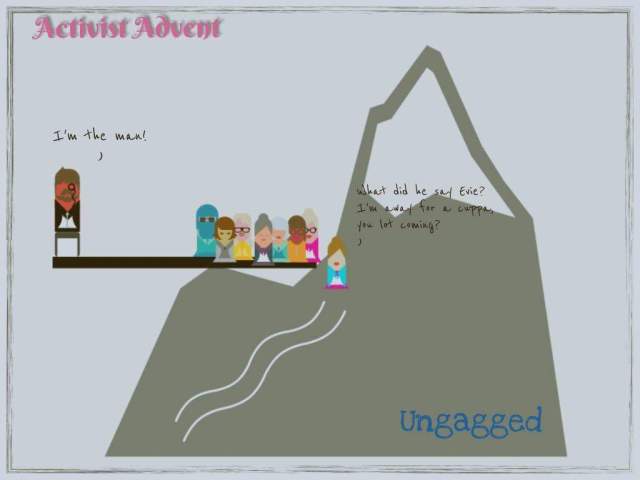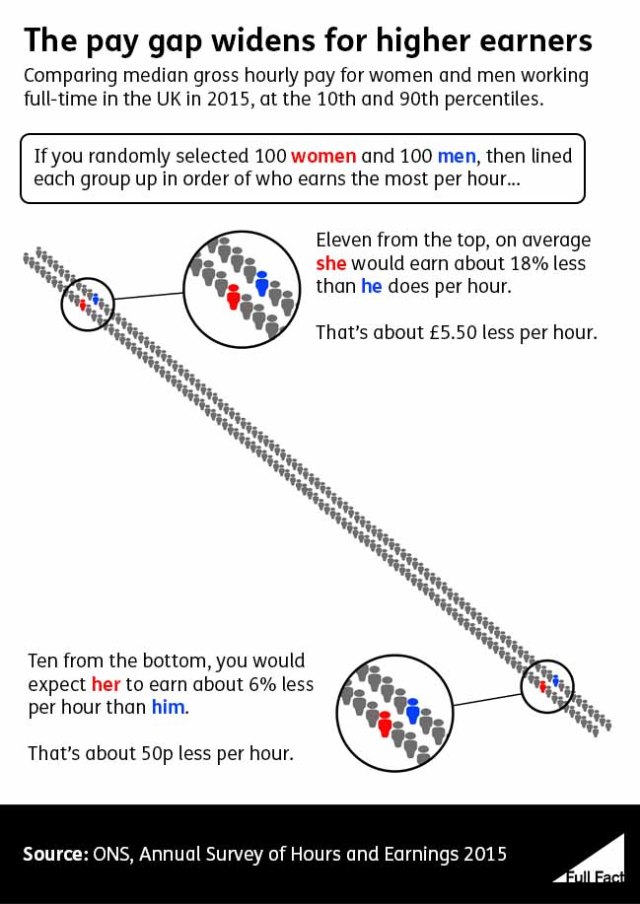
We have the vote, the right to drive, contraceptive choices and more choices with regards to our education and employment prospects than ever before, so we are often told that feminism is no longer necessary in the UK; the battle has been won. We are equal now, ladies, time to put our feet up and have a nice cuppa.
Except that if we scratch the surface, even slightly, we begin to see a very different picture emerge.
Still now, in the uk in 2016, women earn significantly less than men in the same role, with the same qualifications and experience. This is across the board, for women in part time unskilled work, and women in full time, highly paid positions alike, and affects Women of Colour significantly more.
You’d be forgiven for thinking this was an issue of education or qualifications, but that gap actually widens the more skilled a WoC is.
Britain has one of the worst records on gender equality at work, according to a new report that highlighted the high pay gap for working mothers.
Researchers ranked Britain 11th out of 18 countries – behind the US, France, Spain and Sweden – in a league table that took into account pay, board level representation and the gap between male and female employment, among other factors.
From November 10th this year, women effectively stopped earning and started working for free, compared to their male counterparts.

Even in Iceland, the country many experts consider the world’s leader in gender equity, the gender pay gap persists. Women employees make 14 to 18 percent less than men in Iceland — a discrepancy that unions and women’s organizations say means women effectively work for free after 2:38 p.m. In October, in protest of the pay gap, thousands of Icelandic women decided to work the hours their pay merited — by leaving their workplaces promptly when the clock struck 2:38 and taking to the streets to show that without women workers – doing unpaid labour in the home and shouldering most of the childcare – society ceases to function.
The government did try to make childcare more equal – in order to benefit fathers and babies as well as limit damage to mother’s careers by allowing them to take less time off work. Shared Parental Leave has been a spectacular failure though – with as few as 1% of new fathers taking the leave. This is mostly because to do so reduces the mother’s time at home with baby (with WHO guidelines recommending infants are breastfed for their first year, a return to work is neither comfortable nor practical during that time), but also because 50% of men surveyed thought that taking time off to bond with their babies would damage their careers.
Women are culturally expected to take a career break and raise the children, but are also vilified for doing so. The single full time mother is sneered at, accused of being a scrounger, told she should have kept her legs shut if she couldn’t afford kids without help from the state. The single full time dad is praised as some kind of hero at the school gate, offered support from the other parents on the school run, told how brilliant he is for giving up his job to care for his children. The mother in full time work faces a constant guilt trip for not spending enough time with her children, putting own career before school plays and sports days. The father in full time work is lauded for providing for his family. Mums just can’t do right for doing wrong.
We claim that society is equal – yet America has just voted for an outright misogynist who openly admits sexually assaulting women, rating women on their looks, and has made some seriously questionable comments about his own daughter.
We claim society is equal – yet Theresa May and Nicola Sturgeon have more column inches dedicated to their footwear and clothing choices than their policies.
We claim society is equal – yet as many as 1 in 3 women in the UK have been sexually assaulted.
Still, at least it’s christmas. We can all have a nice holiday and put our feet up.
Except that when it comes to labour division, Christmas is probably the most misogynistic time of year. In the vast majority of cases (and we know that it’s not in all cases, of course, before we are buried under a barrage of #NotAllMen!) women will shoulder the brunt of the Christmas work. Women do the majority of the gift shopping, food shopping, Christmas baking, present wrapping, organising the calendar to see all the relatives, cleaning the house to Great Auntie Muriel’s standards, wrapping presents, writing and sending cards, making sure all the little darlings look suitably presentable for visiting the grandparents, making or buying nativity costumes, Christmas meal cooking, Christmas washing up, mediating disputes between children, mediating disputes between Nan and drunk Uncle Tom, putting the house back together after Christmas…and that’s on top of our usual duties.
how to help
Gender inequality is a massive issue, and we aren’t going to fix it overnight. That said, there are still lots of small ways you can make a difference.
If you live in the US, you can support the million women expected to strike on January 20th in protest at Trump’s inauguration (details here)
In the UK you can support Women’s AidWomen’s Aid, a charity that aims to offer practical support for women and children in a variety of ways, from volunteering, donating goods, adding your voice to campaigns or running for Women’s Aid. You can find out more here.
The Everyday Sexism Project website has a really comprehensive list of support organisation services (here) which you can support financially or through volunteer work – or find support from yourself. The list covers support for men as well as women and covers everything from rape crisis, domestic violence support and support for victims of FGM to support for LGBT+ people, support with housing and support for refugees.
Remember that misogyny is, in many cases, considered a hate crime. Don’t stand by, call it out. You wouldn’t tolerate your friends and relatives being racist, bigoted or ableist, so don’t stand for them being sexist either.
Help keep the women around you safe this festive season. That means not leaving women, intoxicated or otherwise, to walk home alone at night, helping women keep an eye on their drinks while out celebrating, and ensuring the women in your life have a safe, reliable way to get home ofrom an evening.
And remember, Christmas is for women too. Heave yourself out of that armchair and go peel some spuds. Run the hoover round before Great Auntie Muriel’s arrives. Do some of the wrapping (the kids wont mind if it looks a mess). Women put a lot of pressure on themselves to make Christmas perfect. Remind them that all we need for a perfect Christmas is to be around the people we love. Tell the women in your life what a fantastic job they are doing, and how lucky you are to have them. Christmas is stressful, but being appreciated makes all the difference.
And remember the golden rule – whoever does the cooking automatically gets out of doing the dishes – even at Christmas!
◇
The ungagged advent team want to make it clear that we are very aware that there are lots of guys who take on caring roles in the family, work just as hard as women and are victims of gendered violence. We do understand that there are lots of ways the patriarchy impacts negatively on men – from boy’s increased risk of suicide, the lack of provision for male victims of rape and abuse, through to toxic stereotypes about what it means to be male and self-worth being tied to earning power. We couldn’t do the whole of feminism justice in a single ungagged advent piece though, which is why we chose to focus on just a few issues for this piece. We are likely to add much more on a range of topics within the subject of feminism to our Ungagged Writing page in the new year.
If you are (or know) a man experiencing domestic violence or abuse you can get help from the Men’s Advice Line (0808 801 0327) or the Mankind Intitative (01823 334244 [including helpline services for deaf people using text relay]) and if you are a man seeking information, support or counselling after being raped or sexually abused, you can contact Survivors UK (0845 122 1201).
Image by Debra Torrance
Written by Victoria Pearson



